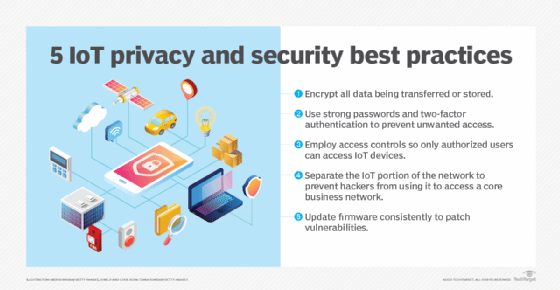What is internet of things privacy (IoT privacy)?
Internet of things privacy, or IoT privacy, is the special consideration required to protect individuals' information from exposure in the IoT environment. These steps are necessary because, in an IoT setting, almost any physical or logical entity or object can be given a unique identifier and the ability to communicate autonomously over the internet or a similar network.
As endpoints, or the things, in the IoT environment transmit collected data autonomously over the internet and typically display that data on mobile applications, they also work in conjunction with other endpoints and communicate with them. Interoperability of things is essential for functioning IoT and enables, for example, networked elements of a smart home to work together smoothly.
The data transmitted by a given endpoint might not cause any privacy issues on its own. For instance, a smart meter used in remote monitoring and data collection for a consumer and their utility company is commonplace and typically harmless. However, when even fragmented data from multiple IoT devices is gathered, collated and analyzed, it can yield sensitive information about people's whereabouts or living patterns, for instance.
The idea of networking appliances and other objects is relatively new, especially in terms of the global connectivity and autonomous data transfer that are central to IoT. As such, security risks have not always been considered in product design, which can make even everyday household objects points of vulnerability.
For example, in 2024, the Indian Computer Emergency Response Team (CERT-In) found a vulnerability in Philips Smart Lighting products. Philips was storing sensitive Wi-Fi credentials in its devices' firmware, creating the potential for the compromise of sensitive personal information and other connected networks. Attackers with physical access to these devices could analyze the data from the extracted firmware and obtain unauthorized access to the stored Wi-Fi credentials. To mitigate this issue, CERT-In encouraged users to upgrade the firmware of their Philips Smart Wi-Fi LED products.
IoT devices, such as smart home appliances, security systems and wearables, collect large amounts of personal information on their users. This can include their location, contact information, healthcare information and even behavioral patterns. If this data falls into the wrong hands, it could be used to commit identity theft, financial fraud or even physical harm.
Strong privacy measures are vital to protecting user information and helping build and maintain their trust and confidence in IoT.
What are IoT privacy risks?
Skepticism and suspicion around IoT systems are often rooted in cybersecurity and privacy concerns. Not only is it increasingly difficult for businesses to ensure their IoT devices are secure, given how advanced hackers and other malicious actors have become, but there is also a public trust issue. Consumers feel their data privacy is at risk; they worry about both the businesses entrusted to safeguard their data and the malicious actors.
The following privacy risks hinder IoT's full potential:
- Excessive data collection. There are billions of connected devices worldwide that generate huge amounts of data in just one day alone. Those acting in bad faith have many targets and opportunities to compromise consumer privacy. As a result, IoT device manufacturers and companies that use these devices have their work cut out to ensure public trust.
- Intrusion into personal space. Hackers can target an unsecured IoT device or network to access personally identifiable information (PII) or other sensitive information about consumers. Device manufacturers and organizations that use those devices also have access to PII data and must take precautions to prevent unauthorized access and misuse.
- Lack of standardization. The lack of standardized security and privacy protocols creates inconsistencies in data protection measures and exposes user privacy to greater risks.
- Private data sharing. A device manufacturer might include in its fine print how it shares consumer data with third parties. If consumers do not read the legalese that comes with their sensors, connected cars and other devices, they could unknowingly have their sensitive data viewed and used by these third parties.
- Inefficient software updates. The manufacturer's failure to consistently update software over the IoT device's lifespan can create vulnerabilities over time. If manufacturers enforce routine software and firmware updates, their devices will have fewer data security vulnerabilities over time.
- The bandwagon effect. This occurs when an organization adopts a trend just because other companies are doing it, sometimes without weighing the potential risks. For example, this can negatively affect organizations such as healthcare providers, insurance companies and automotive manufacturers. Companies often adopt IoT and other new technologies as part of a broader Industry 4.0 transformation without rigorously vetting them or assessing the resources needed to maintain and secure the network and its IoT devices in the long term.
- Flaws in the IoT security ecosystem. Some devices are built for core functions, such as processing data, without attention to security. Future hacks and data breaches will likely draw attention to the need for built-in security.
How to safeguard IoT privacy
According to IoT Analytics' global market forecast in its "State of IoT Summer 2024" report, the number of IoT-connected devices is estimated to grow to 40 billion by 2030. This rapid growth poses significant challenges for organizations to secure all those endpoints.
Organizations can implement the following security measures to help safeguard user privacy and secure devices and networks:
- Data encryption. Use a combination of strong passwords, one-time codes and biometric data to help verify users and prevent unauthorized access.
- Limits on access controls. Implement multifactor authentication and role-based access control to restrict access to authorized users and devices.
- Secure data transmission. Implement end-to-end encryption to ensure data is secure from origin to destination.
- Security patches. Secure devices by ensuring regular firmware updates and the latest software security patches.
- Clear privacy policies. Explicitly inform consumers how their data is being used and require consumer consent for specific data uses.

The state of IoT privacy frameworks
As IoT networks become more common, data privacy becomes an increasingly important topic. Regulations and governance frameworks to ensure privacy might seem like the clearest option, but the extent and comprehensiveness of these vary by location, and private companies might prefer their own approaches.
The General Data Protection Regulation (GDPR) in the European Union (EU) and the Data Protection Act of 2018 in the U.K. are primary examples of IoT regulatory frameworks. GDPR regulates EU citizens' private or personal data both within the EU and when they leave the EU to be used in another country. Also, GDPR standards must be adhered to when IoT products are manufactured, tested and deployed within IoT networks.
Organizations involved in efforts to improve IoT privacy protection include the Industry IoT Consortium (IIC), headquartered in Boston, and the IoT Security Foundation, headquartered in the U.K. In 2024, the ICC integrated with the Digital Twin Consortium, which is managed by the Object Management Group Inc.
Recent updates to IoT regulatory and policy updates include the 2024 EU Cyber Resilience Act, which establishes cybersecurity requirements for digital products sold in the EU, including IoT devices, industrial control units and software installed on electronic devices.
The U.S. government advocates for the use of plain language in IoT privacy policies as a Federal Acquisition Regulation requirement, based on the IoT Cybersecurity Improvement Act of 2020. Although it is also exploring the integration of blockchain technologies for secure data handling, the Deploying American Blockchains Act, reintroduced in 2025, is awaiting consideration by the Senate.
Although numerous states have enacted general privacy laws, California and Oregon are the only two states in the U.S. that have enacted laws regarding the security and privacy of IoT devices. California's IoT Security Law, effective Jan. 1, 2020, requires manufacturers of IoT devices sold in California to provide reasonable security features. California has also adopted the California Consumer Privacy Act, which encompasses IoT privacy, as it requires manufacturers to secure connected devices.
Oregon's IoT Law, passed in 2019, requires manufacturers of IoT devices to equip them with security standards and authentication measures appropriate to the device's function. This refers to the kind of information the device collects, stores or transmits, as well as to authentication using a preprogrammed password.
While these efforts are currently in the hands of private companies, policymakers could play an increased role in this effort in the future, especially if they choose to work with businesses to change laws.
According to an IEEE global survey, AI and data from various connected devices will increase IoT use in numerous areas. Learn what major factors will contribute to IoT's continued growth.







